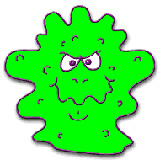|
 Did you ever wonder why or how you became sick? Chances are that germs were the source of your illness. Did you ever wonder why or how you became sick? Chances are that germs were the source of your illness.
Germsare tiny organisms that creep into our bodies and attack ourimmune system.
Unable to live on their own, germs invade our bodies and steal the nutrients and energy that our bodies produce. Aftergobblingup all of our nutrients and vitamins the germs leave behind their own harmful wastes calledtoxins. These toxins are the sources of ourrunny noses, high fevers,diarrheaand hoarse coughs.
There are many different kinds of germs, but the four most common are:bacteria, viruses, fungi and protozoa. Each of these types of germs cause different symptoms or illnesses. For instance, while bacteria germs cause minor illnesses such as ear infections, sore throats andcavities, viruses cause more serious diseases such aschicken pox,measlesand the flu.
Although germs are everywhere, most of the time we don't realize that we have germs because they are so small that you need amicroscopeto see them. Germs spread through the air when someone coughs or sneezes. Or germs can also appear inbodily fluidslikesaliva,sweatand blood. The best way to avoid getting germs is stay away from these areas where germs spread. But the most easiest way to protect yourself from germs is to wash your hands with soap and water frequently. You should always soap up your hands withsudsafter using the bathroom, after touching money, after playing outside or after visiting a sick friend or relative.
|
|
note:
|
germ: 微生物
immune system: 免疫系統(tǒng)
gobble: 狼吞虎咽
toxin: 毒素
runny nose: 流鼻涕的鼻子
diarrhea: 痢疾
throw-up: 嘔吐
bacteria: 細菌
viruses: 病毒
fungi:真菌
protozoa: 原生動物
cavity: 牙齒蛀洞
chicken pox: 水痘
measles: 麻疹
microscope: 顯微鏡
bodily fluids: 體液
saliva:唾液
sweat: 汗
sud: 肥皂水
|
|